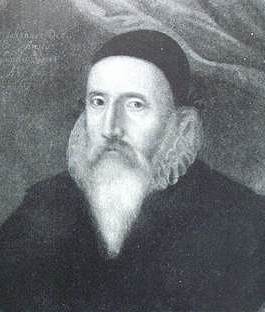The occult?
The career of John Dee (1527-1608) illustrates the way in which what we now distinguish as magic and science were not so separate in the Renaissance.
Dee, Queen Elizabeth's astrologer*, was a distinguished mathematician, pursuing research in geography* and the reformation of the calendar. At the same time, he was a believer in the mystic power of numbers*, and experimented with spiritualism, using an assistant and a crystal ball to talk with the archangels Michael, Gabriel, and Raphael. Dee was a devout Christian, but he was thought by many in his own time to be a magician*. Since astrology was still part of the medical mainstream, however, many of his views were far from eccentric.
The difference between a magician and a magus*.
Shakespeare and astrology
Shakespeare's plays mirror the debate of his time between those who believed that the macrocosm of the stars influenced the microcosm of human life, and those who dismissed astrology as "excellent foppery."
The phrase comes from Edmund in King Lear, who comments on his father's tendency to blame human evil on the stars*. But Edmund is a villain, and his father a foolish old man--so (as usual) it is impossible to locate Shakespeare's own position in the debate.
In Julius Caesar too there is a debate about the influence of the stars, with Cassius, epicurean, arguing for human responsibility: "The fault, dear Brutus, is not in our stars, / But in ourselves, that we are underlings" (1.2.141-42).
The young lovers in Romeo and Juliet are described as "star-crossed" in the Prologue, and they are certainly unlucky, but they also contribute to their own deaths through their haste to consummate their love.
Footnotes
-
A valuable astrologer
As well as deciding on which day she should be crowned, Dee became, in effect, a secret agent for her, uncovering plots to destroy the growing English navy, and developing cryptograms for communicating official secrets.
-
Dee's geographical background
He studied at the university of Louvain under the geographer Mercator, and assisted in establishing the manufacture of navigational instruments in England.
-
The chemistry of numbers
As was Sir Isaac Newton after him. Newton spent more time writing on the numerology of the Book of Revelations than on calculus or gravity.
-
The mysterious Welsh
Dee was of Welsh origin--and proud of it--but the Welsh had a reputation for dabbling in the occult (compare Glendower in Henry IV, Part One), a fact which contributed to his contemporary reputation.
-
A believer and a skeptic
Gloucester: These late eclipses of the sun and moon portend no good to us. . . . Love cools, friendship falls off, brothers divide. In cities, mutinies; in countries, discord; in palaces, treason; and the bond cracked 'twixt son and father.
Edmund: This is the excellent foppery of the world, that when we are sick in fortune, often the surfeits of our own behaviour [our own fault], we make guilty of our disasters th sun, the moon, and stars. . .
(King Lear 1.2.106-24) -
White magic
"Natural science," the study of nature, was also referred to as natural (or "white") magic; to carry out experiments with such phenomena as magnetism or light was to be involved in natural magic.
The scholar deeply involved in such pursuits was often regarded with suspicion--there were severe penalties for sorcery--but to be a master of the forces of nature was to be the magus, the master of natural phenomena. There is some suggestion that Dee, or others like him, may have been the model for Shakespeare's Prospero.
Paracelsus was another experimenter of the time who was thought to be involved with the devil.
Paulina, the magus?
Less obviously, Paulina in The Winter's Tale shares some qualities with the magus, invoking the powers of "white" (lawful) magic in the final scene.
